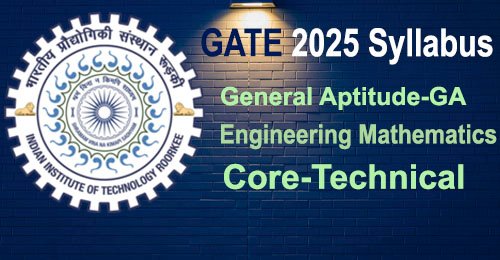GATE 2025 AE Aerospace Engineering Syllabus
Important Note for Candidates: In each of the following subjects the topics have been divided into two categories – Core Topics and Special Topics. The corresponding sections of the question paper will contain 90% of their questions on Core Topics and the remaining 10% on Special Topics.
Section 1: General Aptitude (GA) Syllabus
(Common for all, 10 Question, 15 Marks)
The General Aptitude section is a common component across all papers of the GATE 2025 examination, constituting 15 marks out of 100 for each subject. The syllabus, available on the official website, aids candidates in preparing more effectively for the GATE 2025 exam. The GATE General Aptitude (GA) Syllabus comprises four key sections:
- 1. Quantitative Aptitude
- 2. Verbal Aptitude
- 3. Analytical Aptitude
- 4. Spatial Aptitude
1. Quantitative Aptitude in the General Aptitude (GA) Syllabus covers the following topics:
- Numerical computation and estimation
- Ratios
- Percentages
- Powers
- Exponents and logarithms
- Permutations and combinations
- Series
- Mensuration and Geometry
- Elementary statistics
- Probability
2. Verbal Aptitude in General Aptitude (GA) Syllabus includes the following topics:
| Basic English Grammar | Basic Vocabulary |
|---|---|
| Tenses | Words |
| Articles | Idioms and phrases |
| Prepositions | |
| Conjunctions | |
| Adjectives | |
| Verb-Noun agreement |
3. Analytical Aptitude in the General Aptitude (GA) Syllabus includes the following topics:
- • Logic: deduction and induction
- • Analogy
- • Numerical relations and reasoning
4. Spatial Aptitude in the General Aptitude (GA) Syllabus includes the following topics:
- • Transformation of shapes
- • Translation & Rotation
- • Scaling & Mirroring
- • Assembling & Grouping
- • Cutting & Paper folding pattern
- • Patterns in 2 and 3 dimensions
Section 2A: Engineering Mathematics
Linear Algebra: Matrix algebra, Systems of linear equations, Eigen values and eigenvectors.
Calculus: Functions of single variable, Limit, continuity and differentiability, Taylor series, Mean value theorems, Evaluation of definite and improper integrals, Partial derivatives, Total derivative, Maxima and minima, Gradient, Divergence and Curl, Vector identities, Directional derivatives, Line, Surface and Volume integrals, Stokes, Gauss and Green’s theorems.
Differential equations: First order equations (linear and nonlinear), Higher order linear differential equations with constant coefficients, Cauchy’s and Euler’s equations, Initial and boundary value problems, Laplace transforms, Solutions of one-dimensional heat and wave equations and Laplace equation.
Special Topics: Fourier Series, Laplace Transforms, Numerical methods for linear and nonlinear algebraic equations, Numerical integration and differentiation. Complex analysis. Probability and statistics.
Section 2B Core Subjects : Flight Mechanics
BASICS
Atmosphere: Properties, standard atmosphere. Classification of aircraft. Airplane (fixed-wing aircraft) configuration and various parts. Pressure altitude; equivalent, calibrated, indicated speeds; Primary flight instruments: Altimeter, ASI, VSI, Turn-bank indicator. Angle of attack, sideslip; Roll, pitch & yaw controls. Aerodynamic forces and moments.
Airplane Performance: Drag polar; take-off and landing; steady climb and descent; absolute and service ceiling; range and endurance, load factor, turning flight, V-n diagram. Winds: head, tail and crosswinds.
Static Stability: Stability and control derivatives; longitudinal stick fixed and free stability; horizontal tail position and size; directional stability, vertical tail position and size; lateral stability. Wing dihedral, sweep & position; hinge moments, stick forces.
Special Topics: Dynamic stability: Euler angles; Equations of motion; Decoupling of longitudinal and lateral-directional dynamics; longitudinal modes; lateral-directional modes.
Section 2C Core Subjects : SPACE DYNAMICS
Core Topics:
Central force motion, determination of trajectory and orbital period in simple cases. Kepler’s laws; escape velocity.
No Specials Topics
Section 2C Core Subjects : SPACE DYNAMICS
Basic Fluid Mechanics: Conservation laws: Mass, momentum and energy (Integral and differential form); Dimensional analysis and dynamic similarity.
Potential Flow Theory: Sources, sinks, doublets, line vortex and their superposition. Elementary ideas of viscous flows including boundary layers.
Airfoils and Wings: Airfoil nomenclature; Aerodynamic coefficients: lift, drag and moment; Kutta-Joukoswki theorem; Thin airfoil theory, Kutta condition, starting vortex; Finite wing theory: Induced drag, Prandtl lifting line theory; Critical and drag divergence Mach number.
Compressible Flows: Basic concepts of compressibility, One-dimensional compressible flows, Isentropic flows, Fanno flow, Rayleigh flow; Normal and oblique shocks, Prandtl-Meyer flow; Flow through nozzles and diffusers.
Special Topics: Wind Tunnel Testing: Measurement and visualization techniques. Shock-boundary layer interaction.
Section 2E Core Subjects : STRUCTURES
Strength of Materials: Stress and strain: Three-dimensional transformations, Mohr’s circle, principal stresses, Three-dimensional Hooke's law, Plane stress and strain. Failure theories: Maximum stress, Tresca von Mises. Strain energy. Castigliano’s principles. Statically determinate and indeterminate trusses and beams. Elastic flexural buckling of columns.
Flight Vehicle Structures: Characteristics of aircraft structures and materials. Torsion, bending and shear of thin-walled sections. Loads on aircraft.
Structural Dynamics: Free and forced vibrations of undamped and damped SDOF systems. Free vibrations of undamped 2-DOF systems.
Special Topics: Vibration of beams. Theory of elasticity: Equilibrium and compatibility equations, Airy’s stress function.
Section 2F Core Subjects : PROPULSION
Basics: Thermodynamics, boundary layers, heat transfer, combustion and thermochemistry.
Aerothermodynamics of Aircraft Engines: Thrust, efficiency, range. Brayton cycle.
Engine Performance: Ramjet, turbojet, turbofan, turboprop and turboshaft engines. Afterburners.
Turbomachinery: Axial compressors: Angular momentum, work and compression, characteristic performance of a single axial compressor stage, efficiency of the compressor and degree of reaction, multi-staging. Centrifugal Compressor: Stage dynamics, inducer, impeller and diffuser.
Axial Turbines: Stage performance.
Rockets: Thrust equation and specific impulse, rocket performance. Multi-staging. Chemical rockets. Performance of solid and liquid propellant rockets.
Special Topics: Aerothermodynamics of non-rotating propulsion components such as intakes, combustor and nozzle. Turbine blade cooling. Compressor-turbine matching, Surge and stall.


